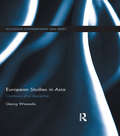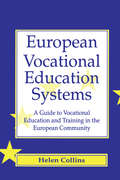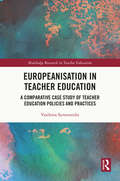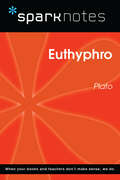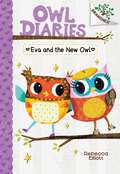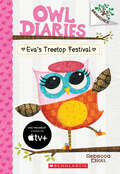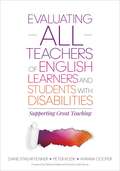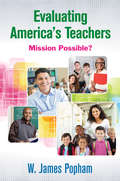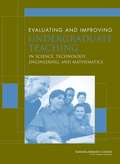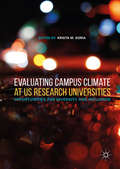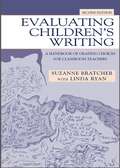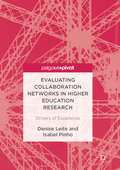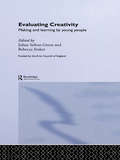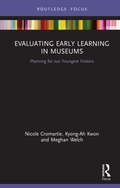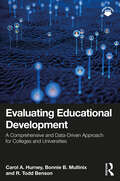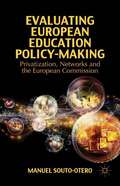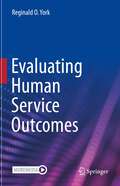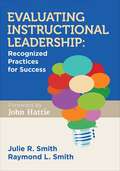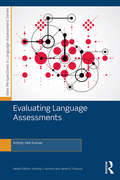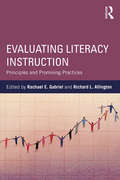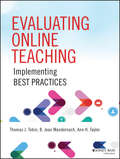- Table View
- List View
European Studies in Asia: Contours of a Discipline (Routledge Contemporary Asia Series)
by Georg WiessalaAs countries across Asia continue to rise and become more assertive global powers, the role that Higher Education has played, and continues to play, in this process is an issue of growing pertinence. Furthermore, understanding the relationship between Europe and Asia fostered by historical and contemporary knowledge transfer, including Higher Education, is crucial to analysing and encouraging the progress of both regional integration and inter-regional cooperation. With a specific focus on international Higher Education, European Studies in Asia investigates knowledge transfer and channels of learning between Europe and Asia from historical, contemporary and teaching perspectives. The book examines a selection of significant historical precedents of intellectual dialogue between the two regions and, in turn, explores contemporary cross-regional discourses both inside and outside of the official frameworks of the European Union (EU) and the Asia--Europe Meetings (ASEM). Drawing on extensive case studies based on many of his own teaching experiences, Georg Wiessala addresses key questions, such as the nature and construction of the European Studies in Asia curriculum; aspects of ‘values’, co-constructed learning and adult pedagogy in the discipline of European Studies in Asia; the politics of Asian host cultures, the ‘internationalization’ of Asian Higher Education and the experiences and expectations of tertiary sector students of this subject in Asia, Australia and New Zealand. In doing so, the author articulates a range of outcomes for the further development of Higher Education cooperation agendas between Asia and Europe, in the discipline of European Studies, and in related fields such as International Relations. This case study-led book makes an original and novel contribution to our understanding of European Studies in Asia. As such, it will be of great interest to students and scholars of Asian Education, Comparative Education, European Studies and International Relations.
European Vocational Educational Systems
by Collins, HelenThis detailed reference work describes the vocational training systems available in EC member states. It deals with the vocational qualification systems within each country and outlines EC programmes that promote the recognition of training schemes.
Europeanisation in Teacher Education: A Comparative Case Study of Teacher Education Policies and Practices (Routledge Research in Teacher Education)
by Vasileios SymeonidisThis book explores the phenomenon and process of Europeanisation in the field of teacher education. Drawing on comparative case studies in Austria, Greece and Hungary, it examines empirical data and analyses key themes around the continuum of teacher education, the development of teacher competence frameworks, and the support to teacher educators. The book is the first of its kind to systematically research the landscape of European teacher education, exploring the interactions between national and European influences in the trajectory of teacher education policy and practice. Chapters offer an original and in-depth understanding of European influences that draw on evidence from policy documents and interviews with relevant stakeholders. It argues that teacher education systems are being Europeanised, although at different speeds and directions for each country. Factors such as the socio-political and economic contexts, historical traits and policy actors’ preferences at both national and institutional levels determine the translation process. This book will be of great interest for academics, educational researchers, practitioners and policymakers in Europe and beyond, informing wider discussions about the emerging European context in teacher education, education policy and what it means to be a European teacher.
Euthyphro (SparkNotes Philosophy Guide)
by SparkNotesEuthyphro (SparkNotes Philosophy Guide) Making the reading experience fun! SparkNotes Philosophy Guides are one-stop guides to the great works of philosophy–masterpieces that stand at the foundations of Western thought. Inside each Philosophy Guide you&’ll find insightful overviews of great philosophical works of the Western world.
Eva And The New Owl (Owl Diaries #4)
by Rebecca ElliottPick a book. Grow a Reader! This series is part of Scholastic's early chapter book line Branches, aimed at newly independent readers. With easy-to-read text, high-interest content, fast-paced plots, and illustrations on every page, these books will boost reading confidence and stamina. Branches books help readers grow! In book #4, a new owl named Hailey starts in Eva's class at school. Eva is always happy to meet new people, and she's excited to make a new friend! But the new owl befriends Lucy instead of her. So Eva gets jealous. Lucy is Eva's best friend! Will Eva lose her best friend? Or can Eva and Lucy BOTH make a new friend?
Eva's Treetop Festival: A Branches Book (Owl Diaries #1)
by Rebecca ElliottThis adorable early chapter book series is perfect for young girls who love friendship stories starring animal characters!This series is part of Scholastic's early chapter book line called Branches, which is aimed at newly independent readers. With easy-to-read text, high-interest content, fast-paced plots, and illustrations on every page, these books will boost reading confidence and stamina. Branches books help readers grow!Eva Wingdale gets in over her head when she offers to organize a spring festival at school. Even with her best friend Lucy's help, there is NO way she will get everything done in time. Will Eva have to ask Sue (a.k.a. Meanie McMeanerson) for help? Or will the festival have to be cancelled? This book is written as Eva's diary -- with Rebecca Elliott's owl-dorable full-color illustrations throughout!
Evaluating ALL Teachers of English Learners and Students With Disabilities: Supporting Great Teaching
by Diane Staehr Fenner Peter L. Kozik Ayanna C. CooperUnique Student Strengths and Needs Require Unique Teacher Evaluation Methods. Teacher evaluation should never be used in a “one-size-fits-all” manner, especially when evaluating all teachers who work with English Learners (ELs) and students with disabilities. Evaluations of all teachers who work with diverse learners require unique considerations. Such considerations are precisely what you’ll learn in this comprehensive, action-oriented book. Backed by research and case studies, the authors detail: Four Principles for Inclusive Teacher Evaluation of diverse learners compatible with the Danielson and Marzano frameworks Specialized “look-fors” evaluators can use and adapt to recognize effective teaching of diverse learners Strategies for coaching teachers who need more support reaching diverse learners
Evaluating ALL Teachers of English Learners and Students With Disabilities: Supporting Great Teaching
by Diane Staehr Fenner Peter L. Kozik Ayanna C. CooperUnique Student Strengths and Needs Require Unique Teacher Evaluation Methods. Teacher evaluation should never be used in a “one-size-fits-all” manner, especially when evaluating all teachers who work with English Learners (ELs) and students with disabilities. Evaluations of all teachers who work with diverse learners require unique considerations. Such considerations are precisely what you’ll learn in this comprehensive, action-oriented book. Backed by research and case studies, the authors detail: Four Principles for Inclusive Teacher Evaluation of diverse learners compatible with the Danielson and Marzano frameworks Specialized “look-fors” evaluators can use and adapt to recognize effective teaching of diverse learners Strategies for coaching teachers who need more support reaching diverse learners
Evaluating America’s Teachers: Mission Possible?
by W. James PophamWhen teacher evaluations are fair, everyone wins. Poor evaluation systems don’t just hurt teachers—they hurt students, too. That’s why America can’t afford to wait for the teacher-evaluation problem to be solved. To provide balanced, accurate, and rigorous evaluations that take into account each teacher’s particular circumstances, only one system can work: evidence-governed collegial judgment. This book includes: A discussion of common evaluation systems, including testing, value-added models, and observations Analysis of federal guidelines and state responses Action steps teachers and school leaders can take to influence policy A clear rationale and strategies for implementing a teacher evaluation model based on human judgment
Evaluating And Improving Undergraduate Teaching: In Science, Technology, Engineering, And Mathematics
by Technology Engineering Committee on Recognizing Evaluating Rewarding Developing Excellence in Teaching of Undergraduate Science MathematicsEconomic, academic, and social forces are causing undergraduate schools to start a fresh examination of teaching effectiveness. Administrators face the complex task of developing equitable, predictable ways to evaluate, encourage, and reward good teaching in science, math, engineering, and technology.Evaluating, and Improving Undergraduate Teaching in Science, Technology, Engineering, and Mathematics offers a vision for systematic evaluation of teaching practices and academic programs, with recommendations to the various stakeholders in higher education about how to achieve change.What is good undergraduate teaching? This book discusses how to evaluate undergraduate teaching of science, mathematics, engineering, and technology and what characterizes effective teaching in these fields.Why has it been difficult for colleges and universities to address the question of teaching effectiveness? The committee explores the implications of differences between the research and teaching cultures-and how practices in rewarding researchers could be transferred to the teaching enterprise.How should administrators approach the evaluation of individual faculty members? And how should evaluation results be used? The committee discusses methodologies, offers practical guidelines, and points out pitfalls.Evaluating, and Improving Undergraduate Teaching in Science, Technology, Engineering, and Mathematics provides a blueprint for institutions ready to build effective evaluation programs for teaching in science fields.
Evaluating Campus Climate at US Research Universities: Opportunities for Diversity and Inclusion
by Krista M. SoriaThis book examines campus climate data collected from undergraduates at several large, public research universities across the nation to enhance understanding of the long-term impact of campus climate on student success. Many universities have refocused their attention and energy on campus climate, defined in this volume as students’ perceptions of how welcoming and respectful their campus environments are for students from different social identities. As structural diversity continues to grow more complex on college campuses around the nation, campus leaders have begun to take more steps to understand campus climate and address persistent inequalities, acts of discrimination, and violence against students from diverse backgrounds. The authors in this volume address initiatives to improve campus climate and provide empirical evidence on the effectiveness of those programs.
Evaluating Children's Writing: A Handbook of Grading Choices for Classroom Teachers
by Suzanne Bratcher Linda RyanEvaluating Children's Writing: A Handbook of Grading Choices for Classroom Teachers, Second Edition introduces and explains a wide range of specific evaluation strategies used by classroom teachers to arrive at grades and gives explicit instructions for implementing them. Samples of student writing accompany the instructions to illustrate the techniques, and an appendix of additional student writing is provided to allow readers to practice particular evaluation strategies.More than just a catalog of grading options, however, this is a handbook with a point of view. Its purpose is to help teachers become intentional about their grading practices. Along with recipes for grading techniques, it offers a philosophy of evaluating student writing that encourages teachers to put grading into a communication context and to make choices among the many options available by determining the instructional purpose of the assignment and considering the advantages and disadvantages of particular grading strategies. Specific grading techniques are integrated with suggestions about the craft of evaluation--guidelines for instructional objectives, for student audience analysis, and for teacher self-analysis that help define communication contexts.New in the Second Edition:*a new chapter on state standards and assessments;*a reorganization of the chapter on approaches to grading;*additions to the chapter on management systems;*additions to the chapter on teaching yourself to grade;*additions to the annotated bibliography; and*updated references throughout the text.
Evaluating Collaboration Networks in Higher Education Research
by Denise Leite Isabel PinhoThis book identifies key factors that drive the development and improvement of higher education research in emerging and advanced economies. In an increasingly interconnected world, knowledge production supported by strong research is a channel for the development of nations. The authors of this book argue that in order to drive knowledge production, leaders must strive to improve their understanding of how global research networks interact with one another, especially from the perspective of internationalization. This book is a useful resource for higher education researchers interested in knowledge production and dissemination as well as academic leaders and practitioners, students, and leaders interested in public administration policies and management.
Evaluating Creativity: Making and Learning by Young People
by Julian Sefton-Green Rebecca SinkerEvaluating Creative Practice discusses: *the function of evaluation in general *the role of formal assessment and its relation with informal evaluation *the role of the audience for the creative product *the value of making within the subject discipline *the balance within the subject paid to product and process *the role of reflection and the place of the students voice. Examples of practice from subject disciplines English, Art, Music, Drama, Media Studies, Design and Technology, Gallery Education and Digital Arts will enable those involved with primary, secondary, further, higher, gallery and community education to learn from each other and to develop a coherent approach to the range of creative work produced by young people. By focusing on questions of evaluation and containing a range of practical examples the book sets an agenda for creative work by young people in the school curriculum and beyond.
Evaluating Early Learning in Museums: Planning for our Youngest Visitors
by Nicole Cromartie Kyong-Ah Kwon Meghan WelchEvaluating Early Learning in Museums presents developmentally appropriate and culturally relevant practices for engaging early learners and their families in informal arts settings. Written by early childhood education researchers and a museum practitioner, the book showcases what high-quality educational programs can offer young children and their families through the case study of a program at the High Museum of Art in Atlanta, Georgia. Providing strategies for building strong community partnerships and audience relationships, the authors also survey evaluation tools for early learning programs and offer strategies to help museums around the world to engage young children. At the center of this narrative is the seminal partnership that developed between researchers and museum educators during the evaluation of a program for toddlers. Illuminating key components of the partnership and the resulting evolution of family offerings at the museum, the book also draws parallels to current work being done at other museums in international contexts. Evaluating Early Learning in Museums illustrates how an interdisciplinary collaboration between researchers and practitioners can improve museum practices. As such, the book will be of interest to researchers and students engaged in the study of museums and early childhood, as well as to practitioners working in museums around the world.
Evaluating Educational Development: A Comprehensive and Data-Driven Approach for Colleges and Universities
by Carol A. Hurney Bonnie B. Mullinix R. Todd BensonThis book establishes a comprehensive and flexible evaluation process for educational developers that answers the question: What can data tell us?Educational developers can use data to monitor and demonstrate the impact of their work, laying the foundation for evidence-based decisions to improve practice. This book guides readers through the process with activities, templates and examples that illustrate how to evaluate educational development work. Data-driven outcome-level evaluation is a critical tool for supporting effective educational development design, as well as programming and systemic change efforts in institutions across the globe. From matrices to practical planning tools and resources, this text equips readers with everything they need to develop a comprehensive evaluation plan that provides direction for the collection, management and use of evaluation data.This guide is for any educational developer who wishes to create evaluation plans that draw out data to inform their work, inspire improved practice and showcase value across the higher education landscape.
Evaluating European Education Policy-Making
by Manuel Souto-OteroThis collection is an inside look at European Commission policy-making in education and the privatization of policy-making in the European Union. Along with contributions from leading academics in the field of European educational policy and policy-sociology, this book also introduces the 'absent voices' in the policy privatization debate: policy consultants and policy-makers. Contributors combine theoretical concepts with empirical research to consider the differences between the EuropeanCommission policy privatization process and similar processes in countries around the world. Evaluating European Education Policy-Making provides the first empirical contribution to the study of the private/public policy networks that the Commission uses for the co-production of its 'statework' in the area of education, and ultimately addresses fundamental questions of democracy and accountability.
Evaluating Human Service Outcomes
by Reginald O. YorkThis all-in-one text assists human service practitioners, and the students of human service educational programs, in the evaluation of their practice with their clients. It takes readers through the entire research process, step by step, starting with the literature review on the nature of the behavior being served, to the development of their study methods, to the statistical analysis of data using the internet and, finally, to the drawing of conclusions based on the outcome study that was conducted. When readers complete this book, they will be prepared to conduct an outcome evaluation study and to present a report to their agencies or instructors. Key distinctions of this text include: guides for analysis of data using Excel, the internet or SPSS for statistical analysis of data; the separation of content into basic concepts and intermediate concepts for use in beginning and intermediate courses in human service research methods; an instructor's manual that offers outlines, lists, and test questions additional to those in the text; a student workbook with practice assignments for use in courses as well as a set of checklists that serve as a guide for various tasks in the research process; and objectives, summaries, and tests in all chapters. Evaluating Human Service Outcomes could be used as the basic text for a beginning course in human service research in educational programs in social work, counseling, and psychology where a major goal is to complete a research study. It could also be used as a supplemental text for advanced research courses that include the analysis of data. The text also should be of interest to human service practitioners who are working in programs funded by grants that require outcome evaluation.
Evaluating Instructional Leadership: Recognized Practices for Success
by Raymond L. Smith Julie Rae SmithImprove principal evaluation and create highly effective leaders! Even with great teachers, student achievement hinges on an effective principal. Behind every high-quality principal is an airtight system of leadership evaluation that consistently rewards excellence and remedies deficits. While teacher evaluation methods have improved, instructional leadership evaluation has often stood still—and student learning and achievement have paid the price. This book identifies the major problems in this process and articulates clear solutions. The result is a blueprint for ensuring the best person for the job is occupying the principal’s chair. Content includes: Extensive data, presented in a user-friendly manner Clear connections to the ISLLC Standards for School Leaders A suite of interactive tools including sample self-assessments, mid-year and final evaluation forms, and professional growth plans "This book not only highlights the key messages about the role of the leader, but it is does so in a way that is engaging, practical, and reflects the Smiths’ long history of being school leaders, teaching school leaders, and seeing the effects of their teaching. I have seen the Smiths in action, separately and together, and they know how to lead and how to teach, they have a strength of purpose they do not waver from, and these attributes come through in this book." -John Hattie, Director Melbourne Education Research Institute, University of Melbourne "After reading this book, you′ll truly understand what it takes to grow as a lead learner. We can always get better. This book provides quality insight on strategies that will make good leaders great." -Brad Currie, School Leader, Corwin Author and Co-Founder of #Satchat
Evaluating Instructional Leadership: Recognized Practices for Success
by Raymond L. Smith Julie Rae SmithImprove principal evaluation and create highly effective leaders! Even with great teachers, student achievement hinges on an effective principal. Behind every high-quality principal is an airtight system of leadership evaluation that consistently rewards excellence and remedies deficits. While teacher evaluation methods have improved, instructional leadership evaluation has often stood still—and student learning and achievement have paid the price. This book identifies the major problems in this process and articulates clear solutions. The result is a blueprint for ensuring the best person for the job is occupying the principal’s chair. Content includes: Extensive data, presented in a user-friendly manner Clear connections to the ISLLC Standards for School Leaders A suite of interactive tools including sample self-assessments, mid-year and final evaluation forms, and professional growth plans "This book not only highlights the key messages about the role of the leader, but it is does so in a way that is engaging, practical, and reflects the Smiths’ long history of being school leaders, teaching school leaders, and seeing the effects of their teaching. I have seen the Smiths in action, separately and together, and they know how to lead and how to teach, they have a strength of purpose they do not waver from, and these attributes come through in this book." -John Hattie, Director Melbourne Education Research Institute, University of Melbourne "After reading this book, you′ll truly understand what it takes to grow as a lead learner. We can always get better. This book provides quality insight on strategies that will make good leaders great." -Brad Currie, School Leader, Corwin Author and Co-Founder of #Satchat
Evaluating Language Assessments (New Perspectives on Language Assessment Series)
by Antony John KunnanEvaluating Language Assessments offers a comprehensive overview of the theoretical bases and research methodologies for the evaluation of language assessments and demonstrates the importance of a fuller understanding of this widely used evaluative tool. The volume explores language assessment evaluation in its wider political, economic, social, legal, and ethical contexts while also illustrating quantitative and qualitative methods through discussions of key research studies. Suitable for students in applied linguistics, second language acquisition and language assessment and education, this book makes the case for a clear and rigorous understanding of the theoretical and methodological underpinnings of language assessment evaluation in order to achieve fair assessments and just institutions.
Evaluating Literacy Instruction: Principles and Promising Practices
by Richard L. Allington Rachael E. GabrielThis must-read book for all literacy educators illuminates the intersection of research on literacy instruction and teacher evaluation. Since 2009, 46 states have changed or revised policies related to evaluating teachers and school leaders. In order for these new policies to be used to support and develop effective literacy instruction, resources are needed that connect the best of what is known about teaching literacy with current evaluation policies and support practices. A major contribution to meeting this need, the volume brings together a range of perspectives on tools, systems, and policies for the evaluation of teaching, organized into two sections: • Crafting Systems and Policies for Evaluating Literacy Instruction • Examples of Alternative Systems/Approaches for Evaluating Literacy Instruction Across the text, expert scholars in the field emphasize the need for literacy professionals to do more than merely apply generic observation instruments for teacher evaluation, but also to consider how these tools reflect professional values, how elements of effective literacy instruction can be unearthed or included within them, and how teacher evaluation systems and policies can be used to increase students’ opportunities to develop literacy.
Evaluating Online Teaching: Implementing Best Practices
by Thomas J. Tobin B. Jean Mandernach Ann H. TaylorCreate a more effective system for evaluating online faculty Evaluating Online Teaching is the first comprehensive book to outline strategies for effectively measuring the quality of online teaching, providing the tools and guidance that faculty members and administrators need. The authors address challenges that colleges and universities face in creating effective online teacher evaluations, including organizational structure, institutional governance, faculty and administrator attitudes, and possible budget constraints. Through the integration of case studies and theory, the text provides practical solutions geared to address challenges and foster effective, efficient evaluations of online teaching. Readers gain access to rubrics, forms, and worksheets that they can customize to fit the needs of their unique institutions. Evaluation methods designed for face-to-face classrooms, from student surveys to administrative observations, are often applied to the online teaching environment, leaving reviewers and instructors with an ill-fitted and incomplete analysis. Evaluating Online Teaching shows how strategies for evaluating online teaching differ from those used in traditional classrooms and vary as a function of the nature, purpose, and focus of the evaluation. This book guides faculty members and administrators in crafting an evaluation process specifically suited to online teaching and learning, for more accurate feedback and better results. Readers will: Learn how to evaluate online teaching performance Examine best practices for student ratings of online teaching Discover methods and tools for gathering informal feedback Understand the online teaching evaluation life cycle The book concludes with an examination of strategies for fostering change across campus, as well as structures for creating a climate of assessment that includes online teaching as a component. Evaluating Online Teaching helps institutions rethink the evaluation process for online teaching, with the end goal of improving teaching and learning, student success, and institutional results.
Evaluating Professional Development
by Thomas R. GuskeyHow do we determine the effects and effectiveness of activities designed to enhance the professional knowledge and skills of educators so that they might improve the learning of students? Thomas R. Guskey explores the processes and procedures involved in evaluating professional development, from the very simple to the very complex, at five increasing levels of sophistication: Participants′ reactions to professional development How much participants learn Evaluating organizational support and change How participants use their new knowledge and skills Improvement in student learning . . . complete with sample evaluation forms, checklists, and helpful hints and tips.
Evaluating Professional Development
by Thomas R. GuskeyHow do we determine the effects and effectiveness of activities designed to enhance the professional knowledge and skills of educators so that they might improve the learning of students? Thomas R. Guskey explores the processes and procedures involved in evaluating professional development, from the very simple to the very complex, at five increasing levels of sophistication: Participants′ reactions to professional development How much participants learn Evaluating organizational support and change How participants use their new knowledge and skills Improvement in student learning . . . complete with sample evaluation forms, checklists, and helpful hints and tips.
